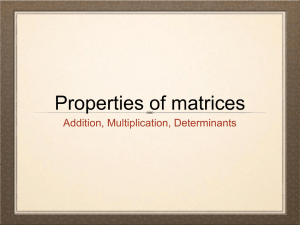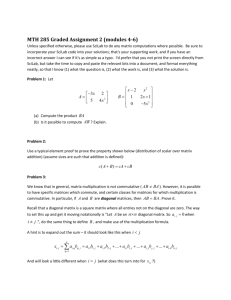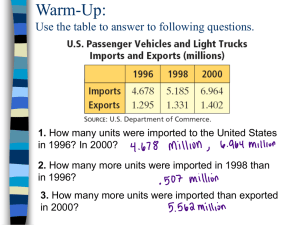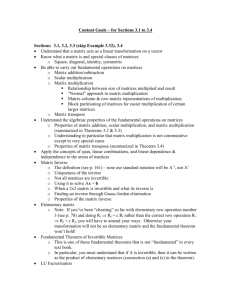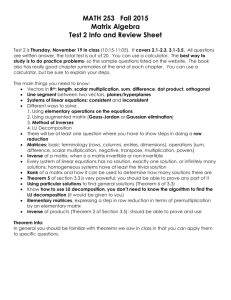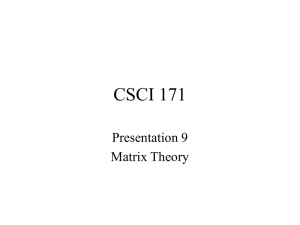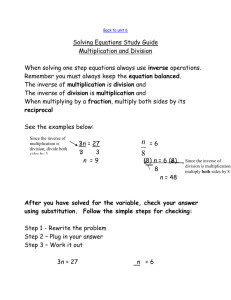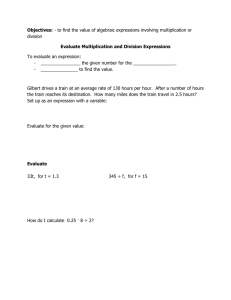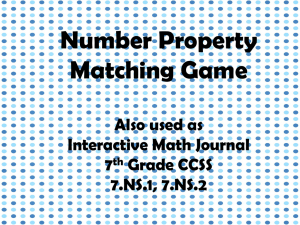Self+Study+Worksheet
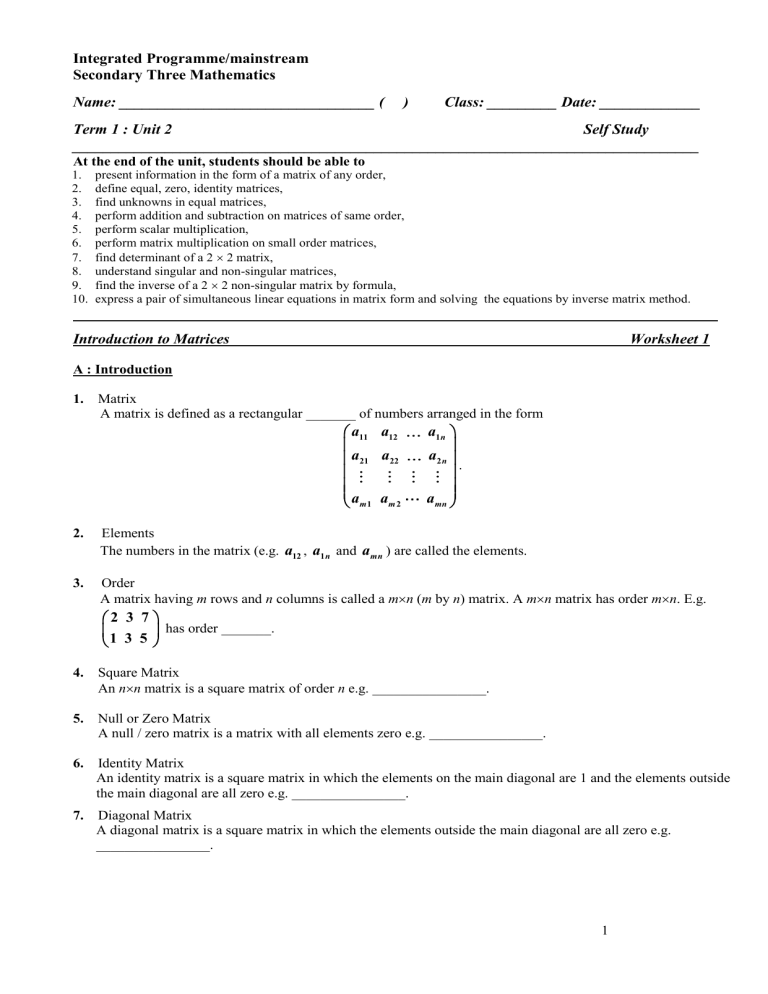
Integrated Programme/mainstream
Secondary Three Mathematics
Name: _________________________________ ( )
Term 1 : Unit 2
Class: _________ Date: _____________
Self Study
_________________________________________________________________________________
At the end of the unit, students should be able to
1.
present information in the form of a matrix of any order,
2.
define equal, zero, identity matrices,
3.
find unknowns in equal matrices,
4.
perform addition and subtraction on matrices of same order,
5.
perform scalar multiplication,
6.
perform matrix multiplication on small order matrices,
7.
find determinant of a 2
2 matrix,
8.
understand singular and non-singular matrices,
9.
find the inverse of a 2
2 non-singular matrix by formula,
10.
express a pair of simultaneous linear equations in matrix form and solving the equations by inverse matrix method.
Introduction to Matrices Worksheet 1
A : Introduction
1. Matrix
A matrix is defined as a rectangular _______ of numbers arranged in the form
a
11 a a
21 a a a m 1
12
22 m 2 a a a
1
2 n n mn
.
2.
Elements
The numbers in the matrix (e.g. a ,
12 a and
1n a ) are called the elements. mn
3. Order
A matrix having m rows and n columns is called a m
n ( m by n ) matrix. A m
n matrix has order m
n . E.g.
2 3 7
1 3 5
has order _______.
4.
Square Matrix
An n
n matrix is a square matrix of order n e.g. ________________.
5.
Null or Zero Matrix
A null / zero matrix is a matrix with all elements zero e.g. ________________.
6.
Identity Matrix
An identity matrix is a square matrix in which the elements on the main diagonal are 1 and the elements outside the main diagonal are all zero e.g. ________________.
7. Diagonal Matrix
A diagonal matrix is a square matrix in which the elements outside the main diagonal are all zero e.g.
________________.
1
B: Notation
We use capital letters ( A , B , etc) to denote matrices.
For example, A =
a a
11
21 a a
12
22
.
Note that a is used to denote the element which appears at the i th row and j th column of the matrix. ij
The identity matrix and null matrix are represented as I and O respectively.
Skill Check 1:
1. In May, Suzanne bought 32 styrofoam balls and decorated them as toy figurines. In June, she sold 12 figurines. In May,
Carrie bought 36 styrofoam balls to decorate and in June, she sold 22 figurines. Which matrix represents all of their May purchases and their June sales?
A. B.
C.
2. What are the dimensions of
A. 1 × 2
C. 2 × 1
?
B. 3 × 5
D. 5 × 3
D. [ ]
[ ]
3. Identify a
31
in
A. 31
C. 10
.
B. -17
D. -6 [ ]
4. What are the dimensions of ?
A. 5 x 3 B. 3 x 5
C. 4 x 5 D. 5 x 4
Matrix Operations
A: Equality of Matrices
Two matrices are equal only if they fulfil both of the following conditions: a.
they have the same order; b.
all corresponding elements are equal.
For example,
1 1
1
2
3.5
4
1
7
2
1.5
4
but
1 2
0 0
1 2
.
[ ]
Worksheet 2
2
Skill Check 2 :
1.
(a)
Evaluate the unknowns:
2 a 5
b
2
7
(b) c
3
2
3 x z
4
2
y 3 4
54 3
(c)
3 x
y x
2 y
2 xy 4
10 1
6 4
B: Matric Operations i) Addition of Matrices
Two matrices can be added together only if they have the same order.
Example
The following table shows the stock of Waris Dirie’s Desert Flower in three bookstores.
Hardcover Softcover
Bookstore 1
Bookstore 2
Bookstore 3
Represent the given information as a matrix A .
A =
23
15
26
17
7
34
The next table shows the replenishments which has just arrived at the bookstores.
Hardcover Softcover
Bookstore 1
Bookstore 2
2
3
10
4
Bookstore 3
Represent this information as a matrix B .
B =
5 11
Adding these two matrices is easy; simply add up the corresponding elements of A and B.
A + B =
What does the answer to A + B represent? ii) Subtraction of Matrices
Subtraction of matrices is similar to addition. Two matrices can be subtracted only if they have the same order. Instead of adding up the corresponding elements of the matrices, we subtract them.
3
E.g.
2 5
2
2
1 4
0.5
8
iii) Scalar Multiplication of Matrices
Example
John wants to organise a barbeque for his classmates. He decided to buy sausages, chicken wings and satay. The following table shows 2 proposals:
Proposal 1
Proposal 2
Represent the above information as a matrix A .
Sausages
24
28
Chicken wings
32
26
Satay
48
56
A =
However there is a change of plan and everyone decides to bring along a partner. Therefore the amount of food has to be doubled.
2 A =
The answer to 2 A can easily be obtained by multiplying every element by 2.
What does the answer to 2 A represent?
Matrix Multiplication and Word Problems Worksheet 3
A: Matrix Multiplication
In summary,
1.
Two matrices, A and B can be multiplied together iff the number of __________ in A is equal to the number of __________ in B .
2.
The multiplication of two matrices, A and B , will give rise to a matrix AB with the number of __________ of
A and the number of __________of B , i.e. A
B
AB .
3.
The product of two matrices, A and B , will give rise to a matrix AB , whose element in the i th row and j th column is the sum of the products formed by multiplying each element in the i th row of A by the corresponding element in the j th column of B .
Skill Check 3 :
1. Compute the products AB and BA for the following, if possible:
(i) A
1 2
3 1
, B
1 4
2 0.5
4
(ii) A
2 3
1 2
, B
2 0.5
1
1 3 4
(iii) A
1 2 2 2
0 4 0 3
, B
1 1
2 0
3 4
B: Laws of Matrix Multiplication
1. Given that A
3
4 0
1
, B
2 5
1 3
and C
Note: ( )
( )
1 0
2 3
, find (i) ( ) , (ii) ( AB C
, this question illustrates that matrix multiplication is associative .
.
5
2. Given that
(i) (
A
C )
2
1
0
1
(ii)
, B
AB
2 4
2 3
AC
and C
(iii)
1
0
(
0
3
B
, find
) (iv) BA CA
Note: (
C )
AB
AC and (
)
, this illustrates that matrix multiplication is distributive over addition.
3. Given that A
2
1
0 0
and C
(i) AB (ii)
4
1
1 3
, find
BA
Note:
Summary:
AB
BA , this question illustrates that matrix multiplication is not commutative.
1.
2.
3.
Matrix multiplication is associative.
Matrix multiplication is distributive over addition and subtraction.
Matrix multiplication is not commutative.
6
C: Word Problems
1. An ice-cream stall sells both green tea and mocha ice cream. A small portion of either costs $0.75 and a large portion costs $1.25. During a short period of time, the number of ice creams sold is own in the table below.
Green Tea small
3 large
4
Mocha 6 3
(i) Write down a column matrix N , representing the cost of each portion of ice cream.
(ii) Given that M
3
6
4
3
, evaluate MN .
(iii) Explain what the numbers given in your answer in (ii) signify.
Answers:
(i) N
0.75
1.25
(ii) MN
3 4
0.75
6 3 1.25
7.25
8.25
(iii) $7.25 is the amount received from the sales of green tea ice cream while $8.25 is the amount received from the sale of mocha ice cream.
As we can see from the example above, matrices can be used in solving word problems.
Skill Check 4:
The matrix below shows the results of John and Paul in a multiple choice test.
Correct No attempt Incorrect
P =
18
20
7
0
5
10
John
Paul
The method to award marks is given by:
Marks
Q =
2
0
1
Correct
No attempt
Incorrect
(i) Find the matrix product PQ.
(ii) Explain clearly what your answer to (a) represents.
7
Matrix Multiplication and Word Problems
A: Determinant
The determinant of a 2 x 2 matrix is defined as:
A =
a c b d
, det A = ad – bc
Worksheet 4
Skill Check 5:
No. M det M= ad - bc
1.
2.
3.
4.
5.
B: Inverse Matrix
The inverse of a square matrix M, denoted by M
–1
, is defined in such a way that MM
–1
= M
–1
M = I , where I is the identity matrix.
For example,
M = and N = .
MN =
=
= –2
So,
Hence, M
–1
=
=
= since MM
–1
= I.
8
Summary :
Given M =
a c
Hence, M -1 = det
1 b d
, det M = ad – bc.
M
d c
a b
.
A matrix whose determinant is zero is called a singular matrix because it does not have an inverse (no 'partner'). A nonsingular matrix has a non-zero determinant and thus has an inverse.
Skill Check 6:
No. N det N N -1
1.
2.
3.
4.
C: Using matrix method to solve simultaneous equations
Given the pair of simultaneous equations : x − 2 y = 1 and x + 4 y = 8. Solve for x and y using matrix method.
Answer: x − 2 y = 1 x + 4 y = 8
Step 1: Transform the equations into matrix form
1
1
4
2
x y
1
8
Step 2: Define the matrices.
Let A =
1
1
4
2
x y
, so A
1
8
=
Step 3: As A A
-1
= I, find A
-1 det A = 1(4) –(-2)(1)
9
7 x − 4 y = 10
= 6
A
-1
=
1
6
4
1
2
1
Step 4: Using matrix multiplication , solve for x and y.
x y
A
1
1
8
x y
1
6
4
1
2
1
1
8
x y
10
3
7
6
So, x = 3
1
3
7
, y =
6
.
Skill Check 7:
Using matrix method , find the value of x and y. x + 5 y = 10
10
